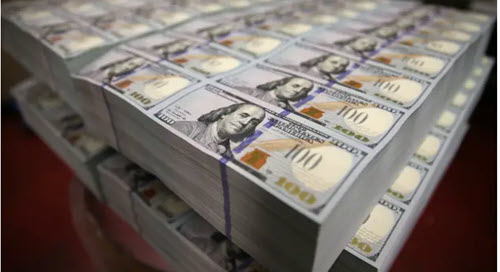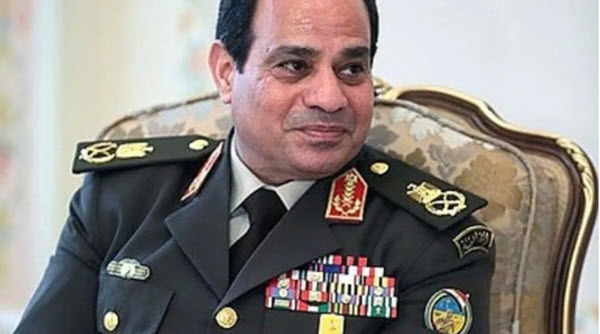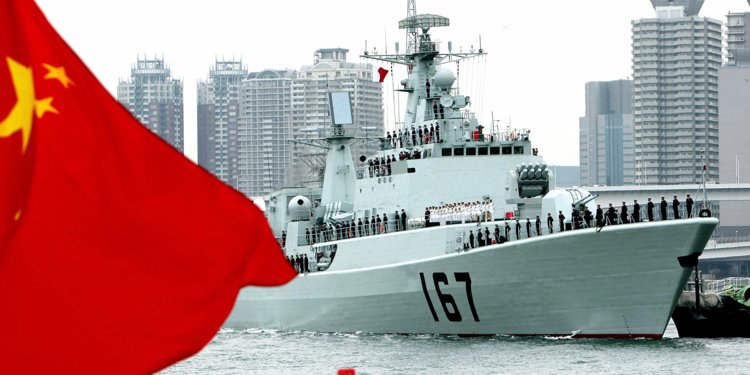Did Trump Accept a $10 Million Bribe from Egypt’s Dictator?
< corruption|312|30|>
A lengthy investigative report in the first week of August by The Washington Post digs deeply into a secret criminal investigation that began early in 2017 when the CIA informed the Justice Department that Egyptian President Abdel Fatah El-Sisi sought to send money to Trump to boost his prospects of winning the presidency.
The Post tracks what became of that investigation, saying that they reviewed thousands of pages of government records, sealed court records, and interviews with over two dozen people. We can as well wonder what became of their story in today’s news. Overwhelmed by the hoorah over Kamala Harris and Tim Walz, what should cause outrage — the possibility that Trump as a candidate for election accepted money from a foreign source in violation of federal law — has completely disappeared. Their report ran to 5,300 words; we’ve summarized in 1,600. It reads like a thriller.
bag men
Five days before Trump became president in January 2017, a bank in Cairo honored a request from an organization linked to the
Egyptian intelligence service to withdraw $10 million in U.S. $100 bills, The Post reports. The bills were to be loaded into two bags that in total weighed some 200 pounds. Four men then came to carry them off.

Federal investigators did not learn of the Cairo withdrawal until early 2019. Before that, there was only the CIA tip that Sisi was interested in a Trump buy-in with no knowledge of an actual transaction. The Justice Department passed on this intelligence to the Mueller investigators to see what might be found, thinking there might be some parallel with the Russian election interference that Mueller and company were charged with probing.
The Mueller team learned that in mid-September, with the 2016 election two months away, Trump had met with Sisi behind closed doors at the U.N., never mind that the Egyptian strongman had seized power in a military coup that had driven out Egypt’s first democratically elected president. Trump would call Sisi a “fantastic guy” and subsequently his “favorite dictator”, inviting him to the White House as one of his first guests.
Mueller’s investigators then found that five weeks after the U.N. meeting, Trump paid his cash-short campaign $10 million. They had bank records of Trump’s principal accounts from May to November of 2016 – just short of Trump’s payment — but could find no influx of money that could be linked to Egypt.
Mueller subpoenaed the National Bank of Egypt in its search for whether there was any matching $10 million transaction and the Post article relates the lengthy battle that occupied Mueller’s Egypt team for the remaining duration of the special counsel’s two-year probe. The case worked its way to the Supreme Court, the question being whether a foreign state-owned bank could be compelled to turn over its records. The Court ruled for Mueller but the bank refused to comply – until it relented in the face of $50,000 a day fines for contempt.
In the thousands of pages the bank turned over, a hand-written letter dated January 15, 2017, was discovered in which an organization called the Research and Studies Center asked the bank to “kindly withdraw a sum of US $9,998,000” in U.S. $100 bills from its branch near Cairo International Airport. Mueller’s team assumed the Center was a front for the Egyptian intelligence service, and that was confirmed by one of the bank managers.
Note that the withdrawal took place two months beyond the May-November 2016 bank records of Trump’s accounts that Mueller’s team had in hand. Investigators theorized that Trump — notoriously averse to spending his own money on his campaign or even for lawyers — had done so in the knowledge that he would shortly receive the $10 million from Sisi. But without further bank records, they had no proof.
Trump showed himself to have no qualms about acceptance of foreign assistance. In June of 2019 this page recounted George Stephanopoulos of ABC asking Mr. Trump in an Oval Office interview,
“If China, if Russia, if someone else offers you information on your opponents, should they accept it or should they call the FBI?”
to which the then-president replied,
“I think maybe you do both. I think maybe you want to listen. There’s nothing wrong with listening. If somebody calls, from a country, Norway, we have information on your opponent. Oh. I think I’d want to hear that.”
Lacking any proof, the Mueller crew could only take note that in 2018, over the objections of his first secretary of state, Rex Tillerson, Trump had his State Department transfer to Egypt $195 million in military aid that had been held back over dictator Sisi’s brutal human rights practices. 
Egyptian President Abdel Fatah El-Sisi.
Close to $1.5 billion would follow, although that would appear to be the annual aid that the U.S. unaccountably gives to the oppressive Sisi regime every year.
Egypt’s interest in influencing U.S. policy recently became public knowledge with the bribery conviction of Democratic Senator Robert Menendez of New Jersey, the former chairman of the Senate Foreign Relations Committee, for taking in hundreds of thousands of dollars in bribes and for acting as an unregistered agent of the Egyptian government.
hot potato
Mueller’s operation wound down in March of 2019 with the probe returned to the Justice Department proper. In April, FBI agents lobbied for obtaining Trump’s bank records for the months that followed the January 2017 Egyptian cash withdrawal. But they were blocked, Post reporters learned. With FBI agents needing access to where evidence was most likely to be found, Trump’s Attorney General William Barr called a halt based on his belief there was not enough evidence.
He handed the matter off to Jessie Liu, the Trump-appointed U.S. Attorney in D.C., to examine the intelligence and decide whether there was enough to warrant further investigation. It was a politically fraught time, with Trump angry at Justice for its probe into Russian election interference. Trump had repeatedly tried to shut down the Mueller investigation, and a new inquiry into an Egyptian bribe — about which the public knew nothing — would be viewed by him as yet another “witch hunt”. But Liu finally relented to FBI pressure and acceded in June of 2019 to their acquiring further Trump bank records. But first she had to run it by Barr, she told them.
trump’s consigliere
What then happened is familiar to what this publication has written about Barr in past articled. Compromising his role as an independent AG, he notoriously ran interference for Trump to the extent that the left called him Trump’s private attorney.
![]() That became clear when Robert Mueller submitted his team’s 448-page report, which had arisen from what Barr described as “an intrusive investigation of a U.S. presidential campaign on the thinnest of suspicions” and called the Mueller probe that ensued “one of the greatest travesties of American history.” With the report withheld from the public awaiting redaction, Barr sabotaged two years of work by the special counsel with a hastily written four-page letter minimizing Mueller’s conclusions despite its leading to 34 indictments. It “did not establish” that the Trump campaign “conspired or coordinated” with Russia, Barr wrote, and that “while this report does not conclude that the President committed a crime” of obstruction of justice, “it also does not exonerate him”.
That became clear when Robert Mueller submitted his team’s 448-page report, which had arisen from what Barr described as “an intrusive investigation of a U.S. presidential campaign on the thinnest of suspicions” and called the Mueller probe that ensued “one of the greatest travesties of American history.” With the report withheld from the public awaiting redaction, Barr sabotaged two years of work by the special counsel with a hastily written four-page letter minimizing Mueller’s conclusions despite its leading to 34 indictments. It “did not establish” that the Trump campaign “conspired or coordinated” with Russia, Barr wrote, and that “while this report does not conclude that the President committed a crime” of obstruction of justice, “it also does not exonerate him”.
Trump was triumphant. “There was no collusion with Russia. There was no obstruction, and none whatsoever and it was a complete and total exoneration”, he declared on the tarmac returning from Mar-a-Lago.
![]() Before the 2020 election, as a Trump loyalist, Barr had gone along with Trump’s imagining that forged ballots would come in from other countries, that the election would be rigged. Only after the election in a volte-face did he declare there had been no ballot fraud of any note.
Before the 2020 election, as a Trump loyalist, Barr had gone along with Trump’s imagining that forged ballots would come in from other countries, that the election would be rigged. Only after the election in a volte-face did he declare there had been no ballot fraud of any note.
![]() Barr and U.S. Attorney John Durham went to Italy together in 2019 in their quest to find malfeasance by Barr’s own FBI department in its investigation of Trump ties to Russia. While there, Italian officials tipped them to a serious financial crime they had gotten wind of. The press was told of this but instead of following the normal channels of having the Justice Department run the tip to ground, Barr handed it to Durham to deal with. In the process, he gave Durham criminal prosecution powers, which suggested to the public that the wrongdoing was by the FBI or perhaps CIA — the investigators in any event. But kept secret was that the Italians had told the duo that the crime was committed by Trump.
Barr and U.S. Attorney John Durham went to Italy together in 2019 in their quest to find malfeasance by Barr’s own FBI department in its investigation of Trump ties to Russia. While there, Italian officials tipped them to a serious financial crime they had gotten wind of. The press was told of this but instead of following the normal channels of having the Justice Department run the tip to ground, Barr handed it to Durham to deal with. In the process, he gave Durham criminal prosecution powers, which suggested to the public that the wrongdoing was by the FBI or perhaps CIA — the investigators in any event. But kept secret was that the Italians had told the duo that the crime was committed by Trump.
When Durham submitted his report after a four-year investigation, there was no mention of the alleged crime. When asked about it while testifying before Congress about his report, Durham said only that “investigative steps were taken, and grand jury subpoenas were issued” but that he saw no reason to include information about the episode in his report.
And so, the serious financial crime allegedly committed by Trump lies buried. At the very least, this is another instance of a Barr cover-up to protect Trump. But we are free to wonder: Was it Sisi’s bribe that the Italians learned of?
intimidation
Rather than giving Liu the go ahead — recall that she had gone to Barr only about permitting a search of further Trump bank records, automatically grated to the FBI were it anyone else — Barr said she should visit CIA headquarters and review all the underlying intelligence that had led to the investigation two years prior. After all, the case against a sitting president is so sensitive. As Trump’s protector, Barr sought to instill hesitancy and doubt in Liu. Suspicious that some of the FBI agents had worked for the Mueller investigation, Barr also met with FBI Director Christopher Wray and his deputies, The Post reports, to assure that “adult supervision” be applied to his agents who were “hell bent” on obtaining bank records.
Catch-22, again
Nevertheless, in September, three months after Liu had acceded to the FBI bank records request pending Barr’s blessing, but diffident to follow through, agents on the case told Liu that without bank records there was no point going any further. Liu, by now intimidated by the politics, rebuffed what amounted to an ultimatum, and said before subpoenaing bank records, the FBI needed first to turn up more evidence, which was the entire point of wanting to examine bank records.
the burial
When the White House nominated Liu for a treasury post, Barr used that as the opportunity to have her step down from the investigation. He replaced her with Timothy Shea, a counselor to Barr. Priorities had shifted. Barr’s preoccupation was to drop the charges against National Security Adviser Michael Flynn and undoing his two guilty pleas of lying to the FBI at cutting way back the sentencing recommendations for Trump adviser Roger Stone, who had just been convicted on multiple felonies. But Shea balked at accommodating Stone. Barr quickly replaced him with Michael Sherwin, a Naval intelligence officer. In other words, in the shuffle, Barr had seen to it that the Egypt case vanished.
In June of 2020, Sherwin closed the probe, citing “a lack of sufficient evidence to prove this case beyond a reasonable doubt.” Incoming Attorney General Merrick Garland could have reopened the case, but the Justice Department says that neither he nor senior prosedutors were ever briefed by outgoing Barr who resigned a month before the transition. The statute of limitations on campaign contribution violations ran out in January of 2022, five years after any cash transfer was most likely to have occurred. The Post tells us that:
“The Justice Department and the U.S. attorney’s office in D.C. declined to answer detailed questions for this report. The FBI declined to answer The Post‘s questions or to make Wray available to comment. Barr also declined to answer detailed questions for this report, and Liu did not respond to a similar inquiry.”

